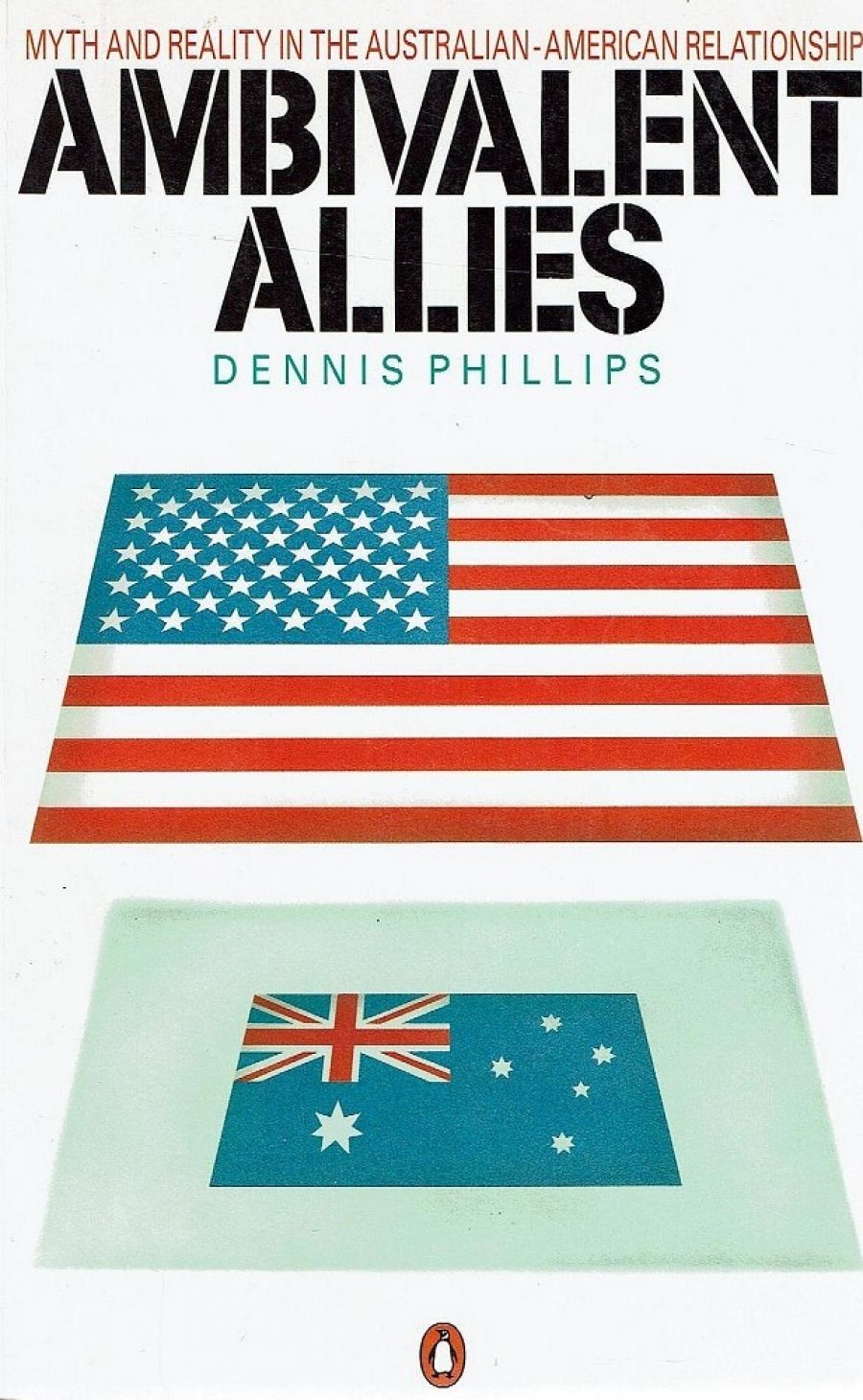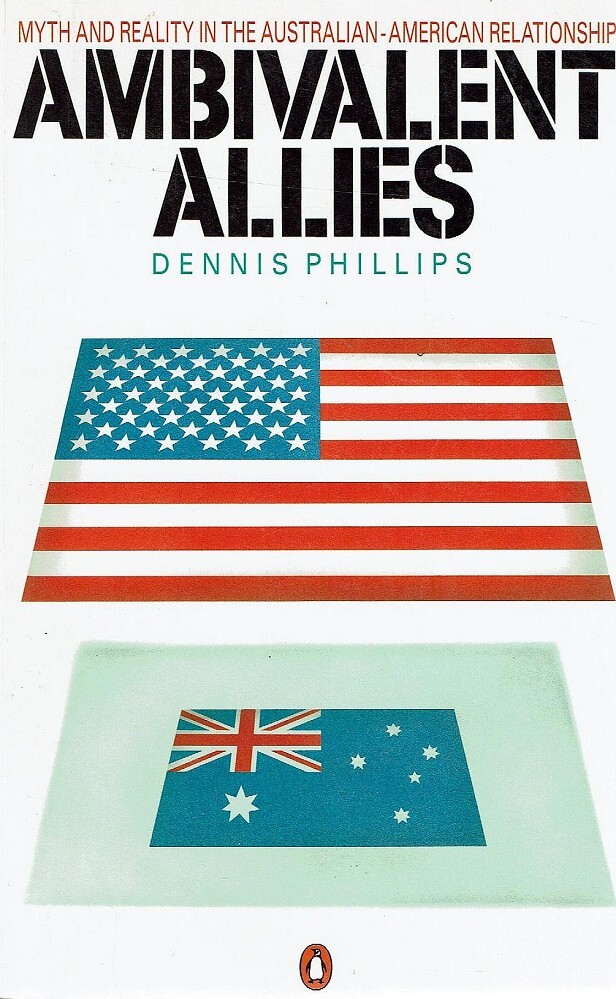
- Free Article: No
- Contents Category: Politics
- Review Article: Yes
- Article Title: Australia adrift in a dangerous global sea
- Online Only: No
- Custom Highlight Text:
These books are about the American Empire and its influence, with the first taking Australia as its focal point. Kolko’s monumental study of Vietnam and its War, and the American role therein and elsewhere, doesn’t even mention Australia. Fair enough, for we were only one of the cosmetic effects employed by Washington to try to cover the hideous face of the War she was conducting.
- Book 1 Title: Myth and Reality in the Australian-American Relationships
- Book 1 Biblio: Penguin, $12.95 pb, 224 pp
- Book 1 Cover Small (400 x 600):

- Book 1 Cover (800 x 1200):

Phillips outlines the extent of the domination of Australian politics, its economy and its popular culture, by America and things American. The domination he describes is in many ways more total, more inescapable than that under the British Empire. Even at the height of World War I jingoism and cringing imitativeness, there were always the Irish and a small but vocal group of Leftists and populists, preaching independence and justice, and a little later, the manifest superiorities of the Soviet Union. But now the neutering of the former and the philosophical and psychological inadequacies of the latter, make dissent, let along a Counter Culture, so much more difficult to engender. The symbols of British domination were highly visible –hence more enthralling to the faithful and their transferred patriotism, as Orwell put it. But also much clearer targets for the iconoclasts. American popular culture established itself with the motion picture and was taken up both as a stimulant and as an alternative to English middle class values. So it only required the collapse of Britain as a reliable Big Brother to provide a vacuum into which the multifaceted expressions of American power could flow almost unopposed. The only likelihood of mounting a successful resistance was drowned in the tidal wave of Cold War hysterics and scapegoating. The discredited pro-British Conservative clones snatched victory from defeat, and it was thereafter downhill all the way. Attempts to staunch the flood by Gorton and Whitlam and to establish an Australian agenda were crushed by the media and Big Business.
Phillips has some interesting pieces – for this is really a collection– on subjects like trade, the respective Anglo Saxon political systems and cultures, the slang and language of Australia and America, and the Australian media. The increasingly unequal and precarious trade situation is well done, though with few suggestions for a happy ending. The chapter on language and mores and different national psychologies is too long, quite predictable, and might as well have been omitted. The constitutional lesson is excellent, and could be used as a teaching aid. Not enough of penetration is said about the role of the media, let alone the kinds of people who own it and work for it. The present wrecking of what was always a poor thing but all we had, is not touched on.
Phillips attributes many of our present discomforts to the Future Shock thesis of Toffler with no suggested remedies. Until this thesis and others like it are treated like Vulgar Marxism – a value free species of historical determinism in the face of which all resistance is futile and misguided – then of course nothing can be done, or said. Phillips is in awe of computerisation and the technological age – almost like the Prince Consort at Crystal Palace. Barry Jones is quoted as Holy Writ, but precious little help, analytically or as hints for effective action any of it is. In other words, a slight book which will nevertheless serve as a good introduction to Australian American politics.
Kolko’s tale, on the other hand, is anything but slight. The story of Vietnam, of course is of almost unrelieved suffering, tragedy and heroism – of vice, mayhem and the degradation of the weak and defenceless, women and children. We have never experienced such a history, though maybe the aborigines could understand. Kolko not only sets out the French War, but its previous system of rule and what they did to the Indo-Chinese. How many of us know that perhaps two million died in a previous famine between the Wars, or of the risings and conspiracies which were crushed? Supported by ethnic Chinese who dominated trade, commerce and money lending to the peasants, and French trained sons of wealthy Vietnamese. France easily ruled the roost until the Japanese War. Only the Communist Party provided real opposition or an effective plan for an independent Vietnam.
Kolko gives an extensive history of that Party, showing how inevitable it was that they would finish up representing Vietnamese nationalism, the other opposition parties being either corrupt, compromised or ineffective. There was no way the Americans could establish a viable South Vietnamese regime – all they did was create an enormous corruption machine, and a large lavishly funded local Army which either couldn’t or wouldn’t fight. America’s apocalyptic bombardments of the countryside, their search and destroy and strategic hamlets campaigns, only drove masses of terrified peasants into the cities, to boost the small radical proletariat. There, the corruption, vice and injustice stoked the fires of revolt. There were 2 million prostitutes in a population of 18 million.
Kolko links Washington’s futile and mendacious tactics to an attempt– perhaps still not relinquished –to control the global system by surrogate regimes, mercenaries and her own awesome fire power when this failed. It failed alright – but Kolko fears few lessons were learned. Central America still bums, and proxy armies attacking Angola and Mozambique show that little has changed.
Stopping the story at 1975 – following upon the astonishing collapse of the South Vietnamese once America withdrew her forces – doesn’t chart the irreversible damage to America’s prestige, her political consensus, or to her and hence the Western economy. But we are reaping the fruits even unto this day, with Reaganite military spending simply speeding up the decline.
It is therefore somewhat ironic, to return to Phillips’ book, that we are still locking ourselves into an outside economic/military system, and taking in more rather than less of its cultural waste, at a time when the Sun is sinking even faster over Disneyland than it did over Madame Tussaud’s.


Comments powered by CComment